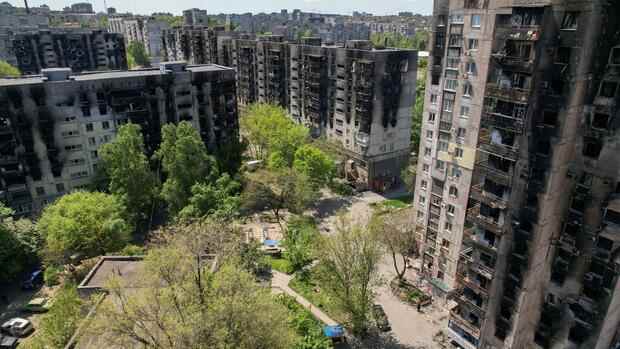Russian assets include Russian central bank funds blocked by Western countries, but also private assets of Russians who have been sanctioned.
Economists hold similar views. Gunter Deuber, Head of Research at Raiffeisen Bank International in Vienna, writes: “Taking into account the country’s gold reserves and the reserves stored in China, around 250 billion to 350 billion euros from the frozen Russian foreign exchange reserves should be readily available for the development of Ukraine .”
Top jobs of the day
Find the best jobs now and
be notified by email.
However, for a variety of reasons, the confiscation of Russian assets may not be as easy as certain politicians and economists imagine. Questions of international law and general law must be taken into account.
Companies in Ukraine are struggling to survive
The destruction inflicted by Russia in Ukraine is enormous. Financially, the country and many companies are struggling to survive. In the short term, they primarily need liquidity to pay wages and social benefits. EU Commission President Ursula von der Leyen told the European Parliament that the Ukrainian administration alone needs five billion euros a month for salaries, pensions and basic services. Von der Leyen referred to estimates by the International Monetary Fund (IMF).
However, companies, for example, can only export part of the goods they produce. Traditionally, Ukraine exported most of its products through Black Sea ports, but these are blocked or destroyed. In April this year, the export volume of agricultural goods was only 31 percent, about 1.5 million tons, of the level in April 2022, says a representative of the agricultural company MHP.
>> Read more: Expensive fertilizer, Ukraine war, drought – food could soon cost even more
Companies are now trying to export more goods by truck or rail. But these means of transport do not have nearly the capacities of ships, especially since bridges, roads and railway junctions have been partially destroyed. This is increasingly becoming a problem for companies.
Although they continue to have expenses, their income is much lower than before the war. In order to be able to continue to exist, they have to take on more debt, or they ask the creditors to waive the interest for the time being. As a result, the obligations add up with each day of the war to an ever-increasing amount.
And those are just the short- and mid-term funding needs. Depending on how long the war lasts, Ukraine’s reconstruction will cost hundreds of billions of dollars. Loans will not help because they are not financially sustainable for a war-torn country. Ukraine will need grants.
Reparation issue associated with many legal obstacles
It is clear that Russia seriously violated international law by attacking Ukraine. The United Nations Organization (UNO), for example, forbids its members to use force against other states in order to assert their own interests. If the countries do not adhere to this principle, the operas of violence are entitled to compensation.
But when it comes to the question of whether the country’s foreign assets can be confiscated, certain principles must be observed. Andreas Müller, Professor of European and International Law at the University of Innsbruck, says: “State assets enjoy strong protection under international law.” If Western states were to access Russian assets, they would violate this immunity protection.
international humanitarian law
This would also put the principle of reciprocity, or the principle of reciprocity, which is firmly anchored in international law, under pressure. but they stick to it because they don’t want other countries to disregard this principle. Lawyer Müller asks: “What do we risk losing if we violate the principle of reciprocity?” That would have consequences for the future international order, says Müller. For example, states could be tempted to freeze foreign assets arbitrarily.
Ultimately, however, the courts and the UN should judge the question of reparations, not politicians. However, the public will have to come to terms with the fact that a legal solution to the question of reparations is associated with many legal obstacles.
Fiji Islands seize $300m yacht from oligarchs
States have the opportunity to go to the International Court of Justice (ICJ) in The Hague and claim violations of international law there. Russia did not accept the ICJ unconditionally. In any case, it would be difficult to assert claims against Russia. The UN would be responsible for this, but Russia has a right of veto there.
Difficult to hold oligarchs liable
Moreover, it will also be difficult to hold the oligarchs accountable for the actions of Russia. The assets of around 1,000 wealthy Russians have now been frozen. The international community cannot access this money without reason either. Courts must constantly check whether an owner of assets is still rightly on the sanctions list.
This is how the Handelsblatt reports on the sanctions against Russian oligarchs:
There is a well-noticed ruling by the European Court of Justice (ECJ) on this. The UN put the Saudi Arabian Yassin Abdullah Kadi on a terrorist list in 2001. Twelve years later, the ECJ ruled that the EU should not freeze Kadi’s assets. There was insufficient evidence that he was involved in terrorist activities.
According to the judges, the actions of the EU must be subject to constant and comprehensive judicial control. The person concerned must also be told why his name is on the list.
More: Read the latest developments in the Ukraine war in the Newsblog

